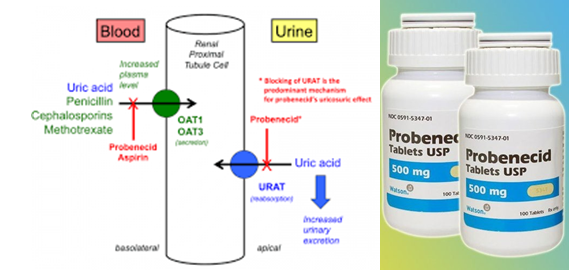The nurse is providing instructions about a client’s new medication. How should the nurse explain the purpose of probenecid, a uricosuric drug?
Decreases pain during urination.
Increases strength of the urine system.
Promotes excretion of uric acid in the urine.
Prevents formation of kidney stones.
The Correct Answer is C
Probenecid is a uricosuric drug that works by inhibiting the reabsorption of uric acid in the kidneys and promotes its excretion in the urine. This drug is used to treat gout and hyperuricemia (high levels of uric acid in the blood). Therefore, the nurse should explain to the client that the purpose of probenecid is to promote the excretion of uric acid in the urine and lower the levels of uric acid in the blood, which can help prevent gout attacks and kidney stones.
Options a, b, and d are incorrect as they do not accurately describe the mechanism of action or purpose of probenecid.

Nursing Test Bank
Naxlex Comprehensive Predictor Exams
Related Questions
Correct Answer is D
Explanation
The client is experiencing syncope (fainting) due to a drop in blood pressure to 70/40 mm Hg, which is too low. This suggests that the client's blood pressure medications are reducing their blood pressure too much, resulting in hypotension. The rationale for the nurse's decision to hold the client's scheduled antihypertensive medications is to prevent further hypotension and allow the client's blood pressure to stabilize at a safer level.
Option a is incorrect because diuresis (increased urine output) is not a likely cause of the client's hypotension.
Option b is incorrect because the client's symptoms suggest hypotension due to reduced blood pressure, rather than drug toxicity.
Option c is incorrect because the antagonistic interaction among blood pressure medications would result in reduced effectiveness but would not necessarily cause hypotension.
Correct Answer is D
Explanation
A total calcium level of 14 mg/dL (3.5 mmol/L) is higher than the normal range of 2.2 to 2.6 millimoles per liter (mmol/L)1. Calcitriol and calcium carbonate are both medications used to increase calcium levels in the blood2. Since the client’s calcium level is already high, it would be important for the nurse to hold both medications and contact the healthcare provider for further instructions.

Whether you are a student looking to ace your exams or a practicing nurse seeking to enhance your expertise , our nursing education contents will empower you with the confidence and competence to make a difference in the lives of patients and become a respected leader in the healthcare field.
Visit Naxlex, invest in your future and unlock endless possibilities with our unparalleled nursing education contents today
Report Wrong Answer on the Current Question
Do you disagree with the answer? If yes, what is your expected answer? Explain.
Kindly be descriptive with the issue you are facing.
